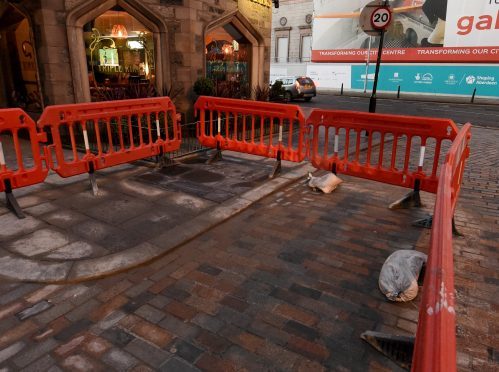Granite cobbles in one of Aberdeen’s oldest streets have been replaced – five months after they were destroyed by workmen and replaced with bitmac.
The tarmac-like substance was spread in a hole left by workers on Belmont Street, who had to destroy paving slabs and cobbles to carry out emergency utility maintenance in August.
The local authority said at the time that the solution was only temporary, but delays on procuring specialised replacement stones meant they were only replaced this week.
Councillor Bill Cormie said: “When they replaced the beautiful Caithness stone and the cobbles with bitmac, it was just horrendous.
“It’s good to see that particular street brought back to normal in the way that it was before, but I just hope that they work hard to do the same on other streets in the city centre which are covered in tar, like Rosemount place, Windmill Brae, and Union Street.
“I’m happy that it’s been fixed up, but really it shouldn’t have been a problem in the first place.”
Dustin Macdonald, chairman of the Aberdeen City Centre Community Council said: “While bitmac can be a good temporary fix, there are far too many black smudges on our walkways and it really doesn’t give the best image of Aberdeen.
“If a utilities company is ripping up our pathways then they have a duty to replace it to the standard it was previously.
“But let’s do it properly the first time, rather than doubling the work by throwing in tar, and having to rip it out and start again months later.”
Aberdeen City Council’s communities, housing and Infrastructure convener Neil Cooney said: “The area had been temporarily repaired, following utility emergency works, while they were waiting for the specialised granite setts to be delivered.
“These are now on site and temporary repair is being removed followed by the installation of the setts.”
In September last year, the council was accused of having a “bizarre bitmac obsession” by Aberdeen Central MSP Kevin Stewart after the substance was slathered over the cobbles of Windmill Brae.
Later that month, council workers using an infra-red heater scraped it off at a cost of £8,000.
